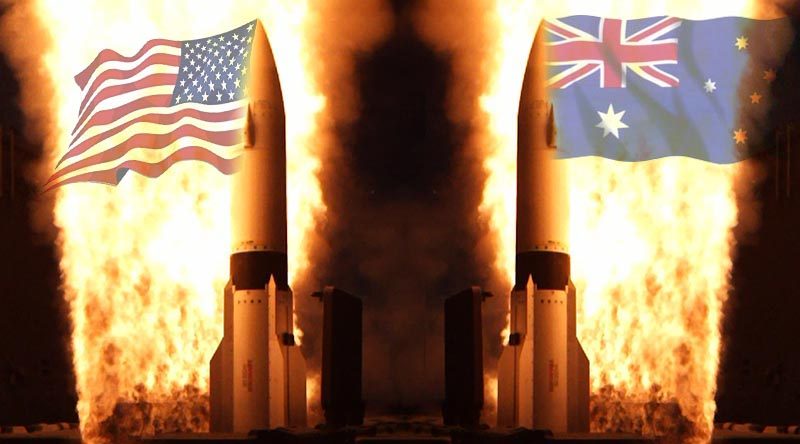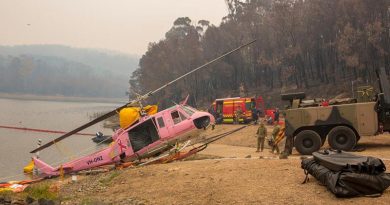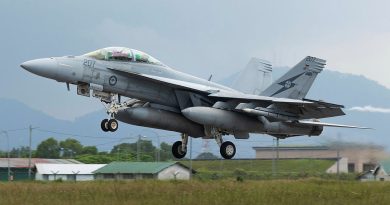US missiles in Australia? – MinDef on ABC Radio
Share the post "US missiles in Australia? – MinDef on ABC Radio"

Minister for Defence Linda Reynolds
On ABC RADIO NATIONAL BREAKFAST
5 August 2019
PATRICIA KARVELAS: The US wants to deploy mid-range missiles somewhere in the Asia-Pacific, and it’s not ruling out northern Australia as a potential base. Would the Government ever agree to housing American warheads on Australian soil?
Composite image by CONTACT
LINDA REYNOLDS: Well Patricia, first let me say that it was a pleasure to co-host – along with the Foreign Minister – our US counterparts here in Sydney yesterday, and it was Secretary Esper’s second week in the job and his first visit overseas, which I think is a great demonstration that the Australia-US alliance continues to be our most important defence relationship, and also the cornerstone of our defence and security policy.
But I’d note this – that as strong as our alliances is, in the face of an increasingly contested region, we have compelling reasons to strengthen it even further. In relation to the issue that you raised of missiles, I did discuss that yesterday with Secretary Esper, and he confirmed that there was no ask of Australia and that none was expected.
PATRICIA KARVELAS: So there was- let’s just clarify this. You’ve been quite clear that there was no formal request for the Government, for Australia, to house American warheads on Australian soil.
LINDA REYNOLDS: No. And as you’d expect, as I said with Secretary Esper being in the second week of his job, you would expect the US Secretary of Defense to canvas all of these issues in light of what’s happening in the Indo-Pacific. But I can confirm that he made no request and that he wasn’t anticipating any request.
PATRICIA KARVELAS: Okay. You say there was no formal request. Let’s accept that. You say there was a discussion about it. So what did that discussion entail then?
LINDA REYNOLDS: Well the discussion was, I had read the media reports about his comments and I asked him directly, was there any expectation of a request? And he said to me no.
PATRICIA KARVELAS: And is that categorical? Has he ruled out that request being made later down the track or a dialogue around this option being on the table?
LINDA REYNOLDS: Patricia, I don’t think I can be any clearer than that. I asked him, was there any expectation of a request? And he said very simply, no.
PATRICIA KARVELAS: Do you think there would be any benefits from having American missiles based in northern Australia?
LINDA REYNOLDS: Well, Patricia, as you would expect yesterday, with such a deep and complex relationship with the United States, we canvassed many, many issues, including China, as you said in your promo, but I cannot be any clearer. He said no, he wasn’t expecting any request.
PATRICIA KARVELAS: And so what do you expect then, given he has put these ideas on the table? Where would these warheads be in our region?
LINDA REYNOLDS: Well, Patricia, I have many great qualities, but being a mind reader is not one of them, and I don’t have a crystal ball either. So …
PATRICIA KARVELAS: [Interrupts] But one of your qualities is also asking questions in these meetings. I imagine you did pursue this issue because it is hugely significant, and it would be a huge shift in relationships in our region.
LINDA REYNOLDS: Well, Patricia, as I said, that’s exactly why I asked the question, and his answer was no.
PATRICIA KARVELAS: Australia’s fuel reserve is precariously low. We learned today that the Government is negotiating with Washington to buy billions of barrels of oil from America’s strategic reserve. Could there be a sort of switch there on the missiles issue or any other issue? How is that going to play out?
LINDA REYNOLDS: Well Patricia I can confirm that the Government is in the early stages of very constructive discussions with the United States about the potential to access their Strategic Petroleum Reserve, which would greatly boost our own stocks and also the flexibility of supply. But we’re not expecting this review or report until the end of this year.
Can I just make this point? This issue is why Australia remains so concerned about what is happening in the Straits of Hormuz, and this is why we’re so engaged with our allies to try and ease tensions in the Gulf. As you know, Australia is reliant on traffic through the Strait of Hormuz for a percentage of our oil supply. So we’re doing everything that we can to be a good government and to be prudent, to make sure that we get a continuity of supply.
PATRICIA KARVELAS: I know you’ve ruled out in this interview, Linda Reynolds, US missiles on Australian soil but this has been on the table, it’s been reported widely. I imagine that has seriously rattled China. Has the Government reached out to Beijing to try and deal with potential fears on this?
LINDA REYNOLDS: Not in relation to this issue, because as I said, the US Secretary of Defense has ruled that out as a matter for us. But look, can I just say about China, it is in no one’s interest in our region or globally to see a competitive US-China relationship becoming adversarial. And as my colleague, the Foreign Minister said yesterday, that the China-US relationship is today the most globally significant bilateral relationship. But for Australia, it’s not a matter of choice between the United States or China. When it comes to China, we have a strong and longstanding relationship and with the United States, they remain our strongest ally. So as per your implication, it is not a matter of choice for Australia.
PATRICIA KARVELAS: If you’re just tuning in, our guest is federal Defence Minister Linda Reynolds, and this is RN Breakfast. The AUSMIN talks focused on what Mark Esper described as Beijing’s disturbing pattern of aggressive and destabilising behaviour. Now all the signs point to deepening security relations between Australia and the US. Is it now beyond doubt that we are siding with Washington in this strategic rivalry with Beijing? We are backing in the United States, regardless of all the Government’s talk of China still being a vitally important partner, which you’ve just raised.
LINDA REYNOLDS: Look as I just said, it’s in no one’s interests for the competitive relationship between the United States and China to become adversarial and we have long standing relationships with both nations and we value both. But the United States is our strongest ally.
PATRICIA KARVELAS: [Interrupted] So in that context are you concerned that it is- yeah okay, are you concerned it is becoming an arms race, a difficult relationship? Because if you listen to the language of Pompeo, it certainly has raised the stakes hasn’t it?
LINDA REYNOLDS: Well that is a matter between the United States and China. What I would say Patricia, is we have a longstanding relationship that we value with both nations. It is a different relationship with both nations, but for Australia it is not a matter simply of choice. Ultimately, whatever this Government does will be in our nation’s sovereign interests.
PATRICIA KARVELAS: Another test for the deepening partnership between Canberra and Washington is the request to join the global coalition protecting international shipping from Iranian interference in the Persian Gulf. Now you’ve confirmed this is being given serious consideration. So let’s just decode that. Is that code for yes, we will take part, but any formal announcement will have to wait until the Prime Minister meets Donald Trump at the White House next month?
LINDA REYNOLDS: No. It means that we are carefully assessing the request and also the complexities of what is occurring in the Middle East, because like all matters in the Middle East it is incredibly complex. So what we are doing is we are assessing that request, what options that we may have. But overnight I also spoke to the new British foreign secretary Ben Wallace. Like us, the United Kingdom are equally alarmed by the increasing tensions in the Gulf region and they also strongly condemn Iran’s attacks on shipping in the Gulf of Oman given some of their vessels have been subject to attack. So we are all making an assessment at the moment. We’re discussing amongst ourselves what the situation is, what our options are and as I said yesterday, whatever Australia decides to do, it will be our own decision in our own sovereign interest.
PATRICIA KARVELAS: Minister, given Australia’s reliance on the free movement of goods especially oil through the Strait of Hormuz, isn’t it in our sovereign interests to join this operation to guarantee safe shipping?
LINDA REYNOLDS: Well that’s exactly why we’re considering the situation at the moment. We’re not going to take any sudden decision. We are carefully considering what the request is from the United States. We’re also looking carefully at what other nations are doing and what they are considering to do and we will make a decision when the time is right and we’ll make a decision that is in Australia’s best interests. But like you said, Australia like so many others is very reliant on traffic through the Straits of Hormuz and we are keen to ensure that the shippings can move through there freely and also securely.
PATRICIA KARVELAS: So does that mean that Australia is leaning to participating because of our own sovereign concerns here?
LINDA REYNOLDS: No. It means that we have a sovereign interest in the free passage of movement through the Straits of Hormuz and we are carefully considering what other nations are doing and what we might usefully do or not do as the case may be. So as I have said, no decision has yet been made.
PATRICIA KARVELAS: Overnight Iran announced that it had captured another foreign oil tanker in the Gulf. That’s the third in a month, has the Government confirmed the seizure and the origin of the ship?
LINDA REYNOLDS: We’re still seeking further information on that but again – I’ll just say this again Patricia – this is why we condemn the recent attacks on shipping and why we are now considering the request to us and also to many other nations by the United States regarding the maritime security in that region, because we do have sovereign interests in what happens and the free passage of shipping through the Straits of Hormuz.
PATRICIA KARVELAS: Can you give us an idea Minister, of when that decision will be made. What timeframe are we talking about here?
LINDA REYNOLDS: Well it is under active consideration at the moment Patricia. But as I said…
PATRICIA KARVELAS: [Interrupts] A month? A couple of weeks?
LINDA REYNOLDS: …Patricia, the decision will be made when we are in a position to make a sound decision on behalf of the Australian people.
PATRICIA KARVELAS: And is it close. Can you give us some indication? It is a pretty key issue for our country.
LINDA REYNOLDS: Patricia, as I’ve said, we are actively considering the issue. I spoke overnight to the British foreign secretary Ben Wallace, to get a steer on what the United Kingdom is doing. We’ve discussed it yesterday with the United States and we are talking to others who are similarly impacted by the restriction of movements through the Straits of Hormuz. So we are actively considering it and we will make a decision when we are in a position to make a sound decision on behalf of the Australian people.
PATRICIA KARVELAS: Minister just briefly, would the Federal Government ever consider taking back ownership of the Darwin Port rather than leaving it to be- continue to be leased by a Chinese company?
LINDA REYNOLDS: Look the lease of the Darwin Port went through the appropriate decision making process at the time and all foreign investment proposals take national security considerations into account.
PATRICIA KARVELAS: Have your views on this shifted? We have a report running – no doubt you’re across it – on the ABC, that people on both sides of politics are concerned about the ownership.
LINDA REYNOLDS: Well my job as Minister for Defence is not to be moved by speculation in the media even if it is on the ABC. So we monitor what is happening and I will take my advice from the national security agencies and not from the headlines in the newspapers.
PATRICIA KARVELAS: Minister thank you so much for your time this morning.
.
.
.
.
.
.

.
.

.
Share the post "US missiles in Australia? – MinDef on ABC Radio"





